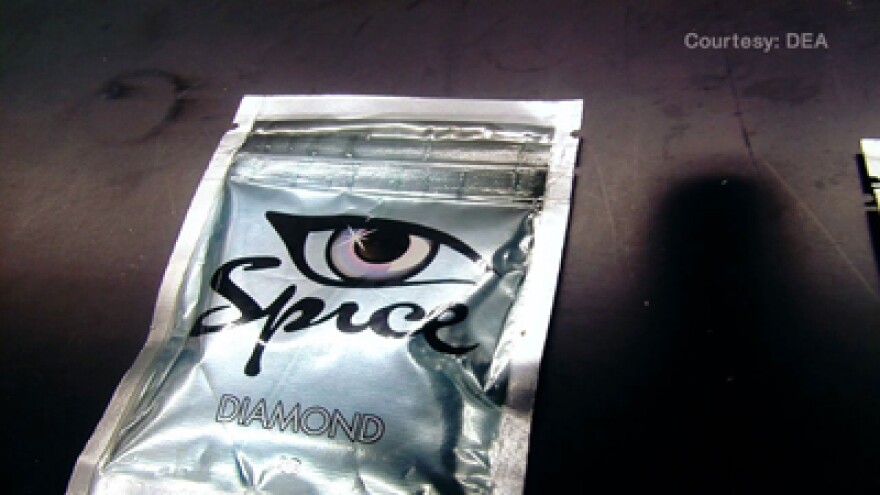Since May 29, the number of patients hospitalized with bad reactions to "K2," the catch-all term used to refer to synthetic marijuana-like substances, has spiked dramatically. Austin-Travis County EMS reports that they've responded to 156 K2 calls since then. Yesterday, more than 12 patients were treated for K2 symptoms at University Medical Center Brackenridge. ATCEMS only responded to one call Tuesday night, which may indicate a waning surge.
Texas lawmakers passed a bill during the most recent session that has updated language sufficient to outlaw the substance, which is essentially plant matter — dried herbs, dried leaves — sprayed with unknown chemical compounds. The bill was signed by Gov. Abbott, but the law doesn't kick in until September 1, and right now hospitals are having to deal with a dramatic influx of bad K2 reactions.
So, after the patients — often homeless individuals — spend six to eight hours recovering in hospital beds, waiting for their blood pressure and heart rate to go down (or go up), they're sent out the door, according to the Director of Emergency Medicine at Brackenridge, Dr. Christopher Ziebell. And if hospital staff finds packets of K2 on the patient's person?
They have to return it to them. It's the patients' personal property, and it's not quite illegal as of yet.
"One of my five patients yesterday had a packet of K2 in his pocket when we got him undressed," says Ziebell. And when that patient was discharged, he got to take his K2 with him.
"We put all their belongings in a bag and hold onto it and give it to the patient at the end of their visit," he says.
Capt. Rick Rutledge of ATCEMS says that efforts were underway to collect samples from hospitals, but he was unsure whether or not any had been collected.
This latest outbreak differs from those in the past, according to both ATCEMS staff and Ziebell. In past cases, K2 ingestion was indicated by symptoms like aggressive or erratic behavior, increased blood pressure and increased heart rate. This latest uptick, though, has hospitals taking in patients who are often comatose — with decreased blood pressure and decreased heart rate.
"About three weeks ago the folks we were getting were all combative. Now they come in sleepy and peaceful. So it does change depending on either what they do to the chemical substance or if they’re mixing something with it," Ziebell says.
The problem with the substance not being technically illegal at the state or local level is that, not only do hospital staff have to release patients with their stashes in hand, it's tough then for the police to obtain samples of what these people are taking to test for the chemicals used.
The uptick in cases in the Austin area, which ATCEMS says have been concentrated in the downtown corridor, has drawn the attention of the federal government.
The Drug Enforcement Agency and the U.S. Attorney are assisting the Organized Crime division of Austin Police in an investigation into the origins of this latest batch, the one suspected to be causing the outbreak. Officials can't comment on the details of the investigation, says a department spokesperson. But people are likening this rash of cases to the rise in popularity of bath salts, another then-technically legal synthetic, in Florida in 2011.
And in trying to skirt the wording of the laws banning bath salts, manufacturers eventually transformed the chemical makeup of that drug to create the terrifying flakka, which has more recently caused erratic behavior, hallucinations and hospitalizations in South Florida.
"We’ve heard about Florida having problems with bath salts, which we see only a very little bit of here in Austin, but in Florida they see a lot of that. Here, it’s the K2 problem. And other communities are not having it to such a big extent," says Ziebell.
According to Lt. Pat Connor with Austin Police, K2 users are often just looking for a cheap high. He says the substance sells on the streets for less than crack.
On September 1, it will become easier to collect samples of the drug for testing and to prosecute those who are buying and selling it. The law going into effect should regulate not only what's available currently but some further analogs of K2. But, according to a forensic chemist with APD, it won't necessarily regulate every future permutation. And, the drug becoming technically illegal doesn't necessarily mean it will disappear altogether, anyway.
It's being sold on the streets to chronic or frequent drug users — Dr. Ziebell says on Monday he treated the same patient for K2 symptoms twice that day — and being produced in covert labs, just like other illegal substances.


